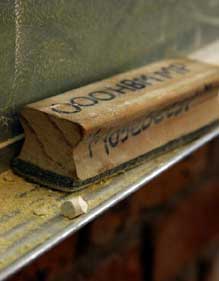
Menoe added that the high incidence of procurement-related corruption that is reported to Corruption Watch shows how essential it is for school governing body members to understand the key principles governing public sector procurement.
“This way, they are better enabled to identify the irregularities and red flags that indicate possible corruption,” he told delegates. Parents too need to be empowered and to access this information as it relates to their children’s schooling. Most importantly, said Menoe, tenders advertised at school level should be made public and transparent to empower parents to monitor the invested public funds.
The conference was a gathering of education researchers, academics, teachers, principals, NGOs and representatives from the national and provincial education departments, among others. They spent two days debating issues within the education sector under the theme “Improving Education through stakeholder collaboration.” Corruption Watch board member and education research specialist Mary Metcalfe is a co-chairperson of the event. “We hope that there is a strong community of committed and innovative educationists working in a range of contexts from whom we can all draw educational nourishment, inspiration and strength,” she wrote in her introductory message for the event.
Other organisations that presented their work in education included Equal Education and Section 27. Speaking on behalf of Section 27, researcher Muhammad Suleman highlighted the plight of learners with disabilities in South Africa.
While the country is home to over 25 000 schools, only 423 facilities cater for learners with special needs, said Suleman. “Only 63 of these offer education up to matric.”
“The minister of basic education declared 2013 as year of special needs,” he added, “and while there has been improvement – with more than 500 schools converted to full-service schools – this does not speak to the needs of learners with special needs.”
A case study of Moshesh High School in Matatiele was presented by Equal Education to demonstrate the desperate need for accountability in South Africa’s schools system. Corruption Watch reported on the plight of learners at Moshesh last year, while one of its courageous matriculants, Zamuxolo Moutloali, was featured in a series that celebrates whistleblowers in December.
Among the issues that the school's learners complained about were a shortage of teachers; high levels of absenteeism; high turnover of educators; shortage of textbooks and poor school management and governance. Realising the need to take matters into their own hands, Moshesh learners then wrote to the district office of their school as well as the provincial department, before escalating their complaints to the office of the minister. When no action was taken by the different levels of the department, they took the legal route and demanded action through the Bhisho High Court. The case has not concluded.
The Corruption Watch message was clear that although schools receive adequate funds to develop and enhance the schooling environment for learners, misappropriation of funds and corruption are a key barrier to delivering these goods.
Another recommendation to help combat schools corruption was that departments must take extra care to ensure that official channels for reporting suspected corruption be widely disseminated so that it is not only public officials who are aware of them, but learners and parents as well.
Sabec takes place once every two years and aims to give stakeholders in the education sector a platform to share challenges and ideas.

